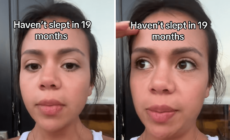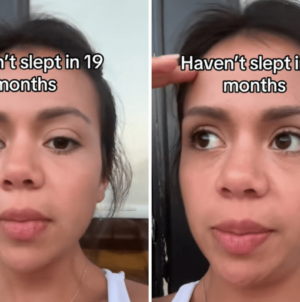-
Millennial Woman Hasn’t Slept the Night in 19 Months—Viewers Shocked Why - 7 mins ago
-
FanDuel Promo Code: Bet $5 Get $300 in Bonus Bets if Your NFL Week 5 Bet Wins - 17 mins ago
-
What Bad Bunny Said in Spanish in ‘SNL’ Monologue - 49 mins ago
-
Colorado Buffaloes vs. TCU Horned Frogs Highlights | FOX College Football - about 1 hour ago
-
Oklahoma Coach Shares Unfortunate John Mateer Injury Update - about 1 hour ago
-
In Step with Buenos Aires: We Are Embracing the Spirit of Argentine Tango - 2 hours ago
-
Teoscar Hernández Finds Redemption With Heroic HR After Defensive Lapse - 2 hours ago
-
Shedeur Sanders Has 1-Word Message for Dillon Gabriel Before 1st NFL Start - 2 hours ago
-
2025 College Football Rankings: Ohio State Stays No. 1 as Penn State, Texas Slide - 2 hours ago
-
Phillies Manager Talks Not Using Ranger Suarez in NLDS Game 1 - 3 hours ago
The Ladybug Recipe: How a Chef Blends Food, Tech, and Menopause Care
One word that’s guaranteed to stop a conversation dead in its tracks: menopause.
Women under a certain age will look at me quizzically, a look that I now return with heartfelt sympathy, thinking to myself, ‘You’ve absolutely no idea what’s ahead of you, do you?’ Women of a certain age will look knowingly and either rev up and embrace the topic, wherever it might take them, or look distinctly uncomfortable, as if the subject weren’t suitable for public airing.
Men, if they’re young enough, will look blankly. If they’re old enough to know what it’s about in theory, they’ll die a death, wishing they were anywhere but. Those with perimenopausal partners might be open to learning something they didn’t already know as they fervently wish for a cure.
In my experience, any mention of the M word is initially met with a resounding silence loaded with ignorance, fear, and frustration, peppered with a tincture of embarrassment, a teaspoon of dread, and a tablespoon of awkwardness.
But that could well be my world. Elsewhere, menopause is making the headlines.
I had no idea that October is officially Menopause Month, and 18 October is World Menopause Day. This isn’t a new thing. It’s been around since 2009, when it was established by the International Menopause Society in collaboration with the World Health Organization (WHO) to “raise awareness of the menopause and the support options available for improving health and well-being”. World Menopause Day came first; the month came later, in 2014.
Each year has a different theme. The two that grabbed me were hot flushes and night sweats (2011) and cognition and mood (2022). This year’s theme is lifestyle medicine.
I’ve learned to embrace it all. And I’m not shy about it. I’ve stopped workshops and meetings for unscheduled coffee breaks when in the throes of a hot flash. My entry in a Write like Bukowski competition a few years back, where I gave the poet a woman’s voice and vented about menopause, made grown men queasy. After my reading, one lad told me how he and his mates were hanging on to the bar, knuckles white, stomachs heaving. “It was good, mind,” he said, “but surely you were exaggerating.”
I wonder where that lad is now. And how he’s doing…
Most men I know feel helpless. They want to fix it. They really do. They don’t want the love of their life to be going through the mill for years. Yes, years! But there is no fix; there is no cure. At best, the symptoms can be managed.
No two women are the same. I’m in Year 11; I’ve one friend who didn’t even notice it had happened (she is one of the lucky 25%). Another swears by hormone replacement therapy (HRT), but that didn’t work for me. Another found cognitive behavioural therapy (CBT) great, but not me. I tried acupuncture, non-hormonal medications, and herbal remedies. All came highly recommended. Nothing worked.
I’m so far into it now that life has adjusted around it. It is what it is. I can still turn on a sixpence, as my dear mam would have said, but himself is coping admirably. Fair play.
Not all men shrink from it; some of the more enlightened ones embrace the challenge.
Take László Orosz, a chef living in Sóstóhegy. When his wife was diagnosed with POI (premature ovarian insufficiency, aka early perimenopause) at the tender age of 35, he went looking for answers. He’s a fixer. With 30 years of experience in the hospitality business, 15 of those in a kitchen, fixing is in his blood.
As a chef, he told me, he sees food as a medicine. “What comes from nature can be used to ease or treat any symptom,” he says with a conviction borne of experience. When, after giving birth to their son, his wife’s post-natal depression and general feeling of unwellness went on for longer than could comfortably fit within a norm, Orosz started looking for solutions in what he knew best: food.
One example he gave me was the simple yam. Pharmaceutical companies use extracts from this sweet potato to make oestrogen. And oestrogen is what every perimenopausal woman needs. Buckets of the stuff.
There are six nutrients we perimenopausal women need to keep track of and make a conscious effort to include in our food: fibre, protein, calcium, magnesium, Omega-3, and vitamin D. We need to track them. And we need to cook them.
Enter Orosz’s Ladybug App.
It’s not simply a nutrient tracker, he says. “It’s a companion for women navigating menopause and beyond.” You enter what you eat and see if you’re getting all the nutrients you need.
Orosz has built a list of 400+ everyday ingredients (like beef, cabbage, apples, etc.), researched for their content of the six key nutrients that matter most in menopause. These appear in the app as ingredient lists searchable by category (dairy, veg, etc.), which enables you to “add your own meal” to track nutrition. The list includes things you can pick up easily in the average grocery store, something that shows he knows what he’s on about. Not everyone has access to speciality shops. [I spend way too much of my time asking Google what ingredient I can substitute for the one I can’t find.]
The key ingredient, though, is the CHEF tab, where, each week, Orosz uploads new recipes that he’s created or curated. These recipes are designed with the menopause in mind. They cover everything from smoothies and snacks to light lunches and elaborate dinners, and can be saved to your personal cookbook.
Each recipe tells you how much of which nutrients you’re getting. And while the app tracks only these six, if you’re getting them, you’ll also be getting other good ones like vitamins C, K, and the suite of Bs. As we age, our bodies need fewer calories, but these nutrients are a constant.
Ladybug App targets women aged 35 and up. POI affects about 1% of women under 40. But, as Orosz says, it’s never too soon to start laying that solid foundation. About 75% of women will experience symptoms to varying degrees. You do the math.
The app is set to go live on World Menopause Day, 18 October. The first 1,000 subscribers will lock in a rate of €7.99/month or €79.90/year for life. You can sign up for early access at www.ladybugapp.net
Looking back, I’m wondering how much better the last 11 years might have been for me (and those who’ve had to deal with my vagaries and vacillations) had I paid more attention to feeding my body in preparation for the change.
But now, you know. And don’t be shy about it. Tell others, too.
Source link





























